15th UBE Classical Concert Special Dialogue
15th UBE Classical Concert
Next Generation Music Culture Promotion Project
Japan Philharmonic Orchestra Ube Concert
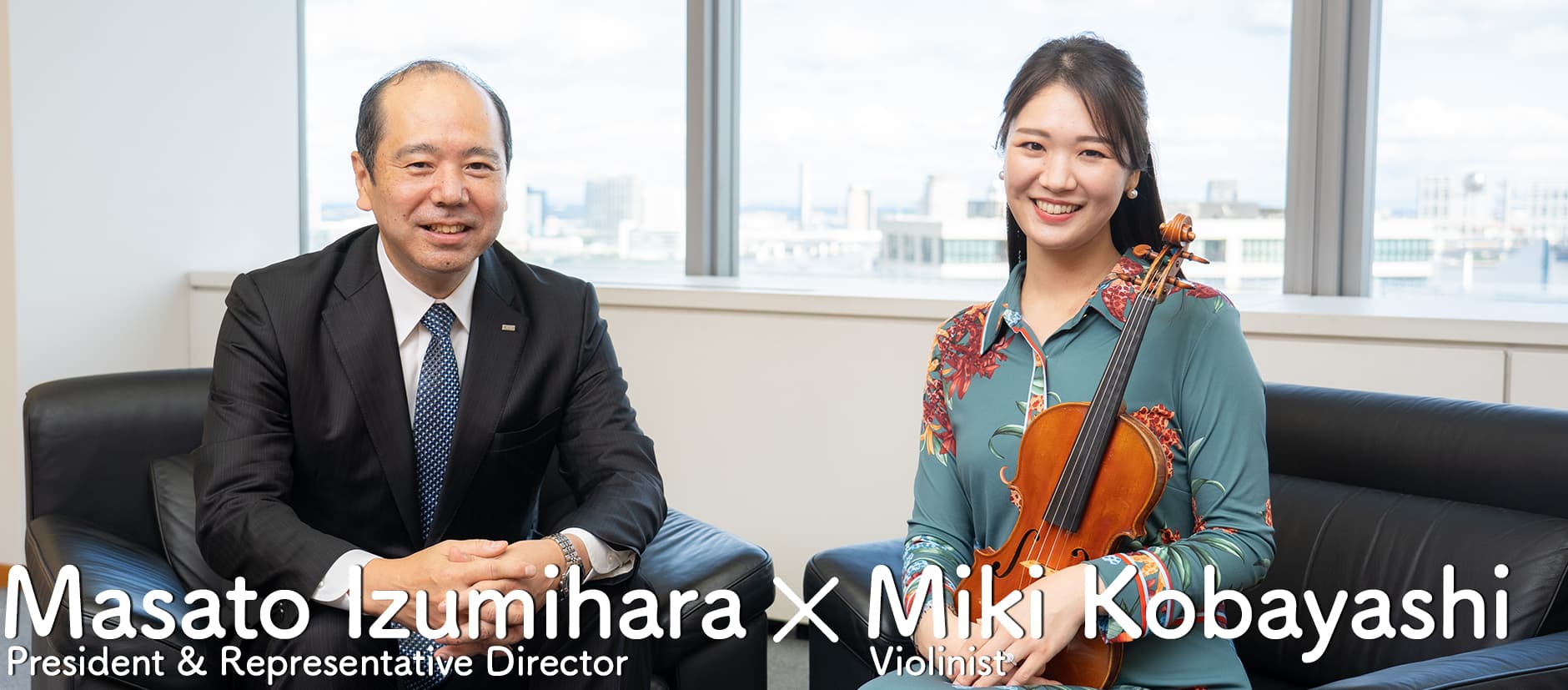
Hoping to Bring Music to Children in the Community in the Spirit of UBE’s Founding Principles of “Coexistence and Mutual Prosperity”
Since 2008, the UBE Group has held the UBE Group Charity Concert with the aim of contributing to the development of local culture through music. This year, the 15th year of the concert, the name will be changed to “UBE Classical Concert,” and more emphasis will be placed on supporting children’s music education (in schools). In the runup to the concert, President Izumihara and violinist Miki Kobayashi, who will perform as the soloist, had a conversation about the concert.
- Grateful for a Life as a Musician
- President Izumihara: Thank you very much for joining me for this talk today. I am very much looking forward to this year’s UBE Classical Concert, with you, Ms. Kobayashi, as the violin soloist.
- Kobayashi: Thank you.
-
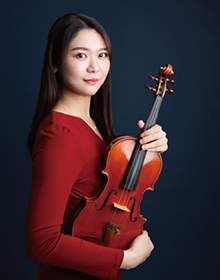 ©Yasuo Yamabuki
©Yasuo Yamabuki
Izumihara: I understand that you were born in the United States in 1990, which was right around the time I was stationed in New York. Large cities such as New York abound in opportunities to experience all kinds of music and art, but this is not the case in regional cities in either the U.S. or Japan. I feel that this concert in Ube, a regional city, is of great significance in providing the local people with the opportunity to enjoy a first-class orchestra performance live.
At what age did you start playing the violin?
-
Kobayashi: Both of my parents were music lovers, and I started practicing on a 1/8-size violin when I was four years old. The instrument I use now was bought for me by my grandmother when I was 15 years old. It was made by an Italian violin maker named Fagnola in 1929. When I was looking for an instrument, I tried dozens, but could not find one that I liked. But the day after my dog, who had been with me for 14 years, passed away, a music store contacted me and I met the instrument I am still using today. I cherish it as a reincarnation of my dog. Violins are inherited by performers of the time over decades and centuries, and I am entrusted with a part of the history of this instrument.
-
Izumihara: I see. It seems like fate for a performer to encounter an instrument that is a good fit. Your older sister is a professional pianist. Did you ever want to play the same instrument as she does?
-
Kobayashi: Piano is often played alone, but I prefer to play with others rather than alone, so violin is more suited for me.
-
Izumihara: It must have been difficult to balance violin practice and schoolwork.
-
Kobayashi: I love music, and as long as I can remember, all I could think about was a career in music, so I have no memories at all of how hard it was to practice. I am truly grateful to my parents for guiding me toward a career in music.
- Letting Individuality Shine and Showing One’s True Gift
-
Izumihara: You have won prizes in numerous competitions since you were in elementary school, and you won the 2nd Prize at the Wieniawski International Violin Competition. Your talent blossomed at a young age, and you have had a wonderful career, but did you ever hit any roadblocks?
-
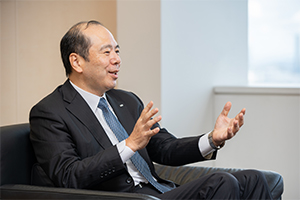
Kobayashi: When I was in elementary school, I won first prize in the Student Music Concours of Japan, Elementary School Division, in Tokyo. However, when I became a high school student and started taking part in competitions outside Japan, I found that simply playing well did not get me to the top. Evaluations in Japanese competitions are based on a subtractive system, so the emphasis is on playing accurately, whereas evaluations in competitions outside Japan are based on an additive system. It was not until I saw the other contestants displaying their own style of dignity and grace on stage that I realized that what is important for a professional performer is not only good playing, but also entertaining the audience with a unique onstage demeanor and personality. From then on, I think I was able to show my true gift.
-
Izumihara: Going abroad, after all, gives one a chance to reflect on oneself in many ways. I heard that you studied abroad in Vienna. How was that experience?
-
Kobayashi: Vienna is a city where everyday life is filled with music. The background music in the restrooms was opera, and cab drivers talked about music. I was impressed by how much music was everywhere, as if we were breathing it in. I was very happy to study in such a wonderful environment.
-
Izumihara: How much do you usually practice?
-
Kobayashi: Before a concert, I practice all the time except when I eat and sleep. But the day after the concert, I do not touch my instrument and relax.
-
Izumihara: It must be physically demanding. It seems like the day of complete rest for a pitcher the day after a game. Is the pressure before a concert considerable?
-
Kobayashi: I worry about details and think about practicing until just before I go to bed, but I do things at my own pace by nature, so I can adjust my mental orientation quickly. I try to think about delivering a good performance to the audience rather than worrying about whether I will make a mistake.
-
Izumihara: It is the same with corporate management. We cannot hope to make great strides unless we take on challenges without fear of failure. And while it is important to improve on weaknesses, I believe it is even more important to consider how to develop strengths in order to increase the value of the company.
- Hoping to Keep Delivering the Joy of Music
-
Izumihara: On a different note, many concerts were canceled due to the spread of COVID-19. How did that affect you?
-
Kobayashi: When concerts were canceled from February through August of 2020, I felt down when I thought that I had no place to showcase my work even if I practiced. So, I became absorbed in my hobby of baking bread. Around May, I finally started to feel more positive and resumed practicing, trying to play even just one page of practice music a day.
-
Izumihara: The way we work has also changed dramatically at our company. Our Tokyo office had prepared a system that allowed remote working in preparation for the Olympics, so we were able to make a relatively smooth transition to the new way of working while keeping the percentage of people coming into the office down. On the other hand, our factories and other facilities must continue to operate while taking thorough measures against infection. In particular, since our company provides a broad range of basic materials that are widely used for various daily necessities and required to maintain social infrastructure, we have had to overcome this problem by getting inventive at each site, in order to protect people’s lives and the economy.
Despite these difficult circumstances, we held the concert in Ube in 2020 and 2021 without interruption. It would have been easy to decide to cancel the concerts, but the enthusiasm of the staff at the secretariat made it possible to hold them. We wanted to feel proud of what we could do despite COVID-19, instead of saying it couldn’t be done because of COVID-19. And we wanted to keep the light of music burning for the people of Ube, who always look forward to the concert. In 2020, we held two concerts with the audience limited to 20% of the venue’s capacity, and in 2021, one concert limited to 50%. This year it looks like we will be able to hold the concert as close to the original format as possible.
-
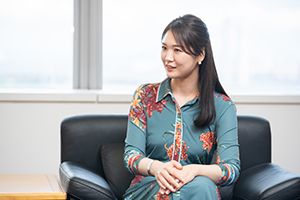
Kobayashi: How did you come to give concerts in Ube City?
-
Izumihara: Our company was founded in Ube in 1897. It began with coal mining and later expanded its business to machinery, cement, and chemicals. From the very beginning, we have had a history of working together with the local community under our founding principles of “coexistence and mutual prosperity.” We have also contributed to the establishment of social infrastructure such as electricity and railroads, as well as hospitals and schools.
The concert venue, the Watanabe Memorial Hall, was built to commemorate the achievements of the company’s founder and then donated to the city of Ube. The hall has a reputation for its excellent acoustics and has been the venue for performances by world-renowned masters such as the violinist Menuhin and the pianist Cortot.
Since then, we have continued to make social contributions in accordance with each era, but on the occasion of our 110th anniversary in 2007, we wondered if there was a way to deepen our ties with the local community. As a result, in 2008, we decided to invite the Japan Philharmonic Orchestra to perform a concert in Ube with the aims of providing residents of the city with an opportunity to experience high-quality classical music, improving local music culture, and contributing to the development of the next generation. The event was a great success, partly because Ube has always been home to many lovers of classical music, and the tickets sold out immediately. The concert has been held annually ever since.
-
Kobayashi: I hear that the concert is well-liked by the local community for its live broadcast via FM broadcasting and original programs planned and managed by employees.
-
Izumihara: Yes, and in addition to the main performance, we also hold a friendship concert at a hospital the day before the main performance, for hospitalized patients who have difficulty getting to the venue. (Due to the COVID-19 pandemic, the event has been held with footage recorded in Tokyo since 2020.) When I see patients in wheelchairs listening happily to the music, rhythmically tapping their fingers, I feel the significance of delivering music to them.
-
Kobayashi: The community really looks forward to this concert. I understand that this year will be the 15th.
-
Izumihara: That’s right. What’s more, this year marks our 125th anniversary, and we have changed our company name to UBE Corporation, so we also rethought the nature of the concert. We will focus on supporting music education for the children of the next generation and invite 400 elementary and junior high school students free of charge. This is also connected to SDG 4 “Quality Education.” We hope that the children will experience the energy of a first-class orchestra and become more aware of the appeal of classical music. I am sure that your violin playing will bring the brilliance of this music directly to the children’s hearts.
-
Kobayashi: The three pieces I will be playing (Salut d’Amour, Introduction and Rondo Capriccioso, and Zigeunerweisen) are famous works that I’m sure everyone has heard at some point and will enjoy. A musician may play the same piece on different occasions, but each live performance will be different. I hope people will enjoy the performance they encounter at that time, showering in the music with their whole body, so to speak. And an orchestra is composed of various instruments. Please feel the breath of each player and enjoy watching them play. I hope you will enjoy the special quality of a live performance.
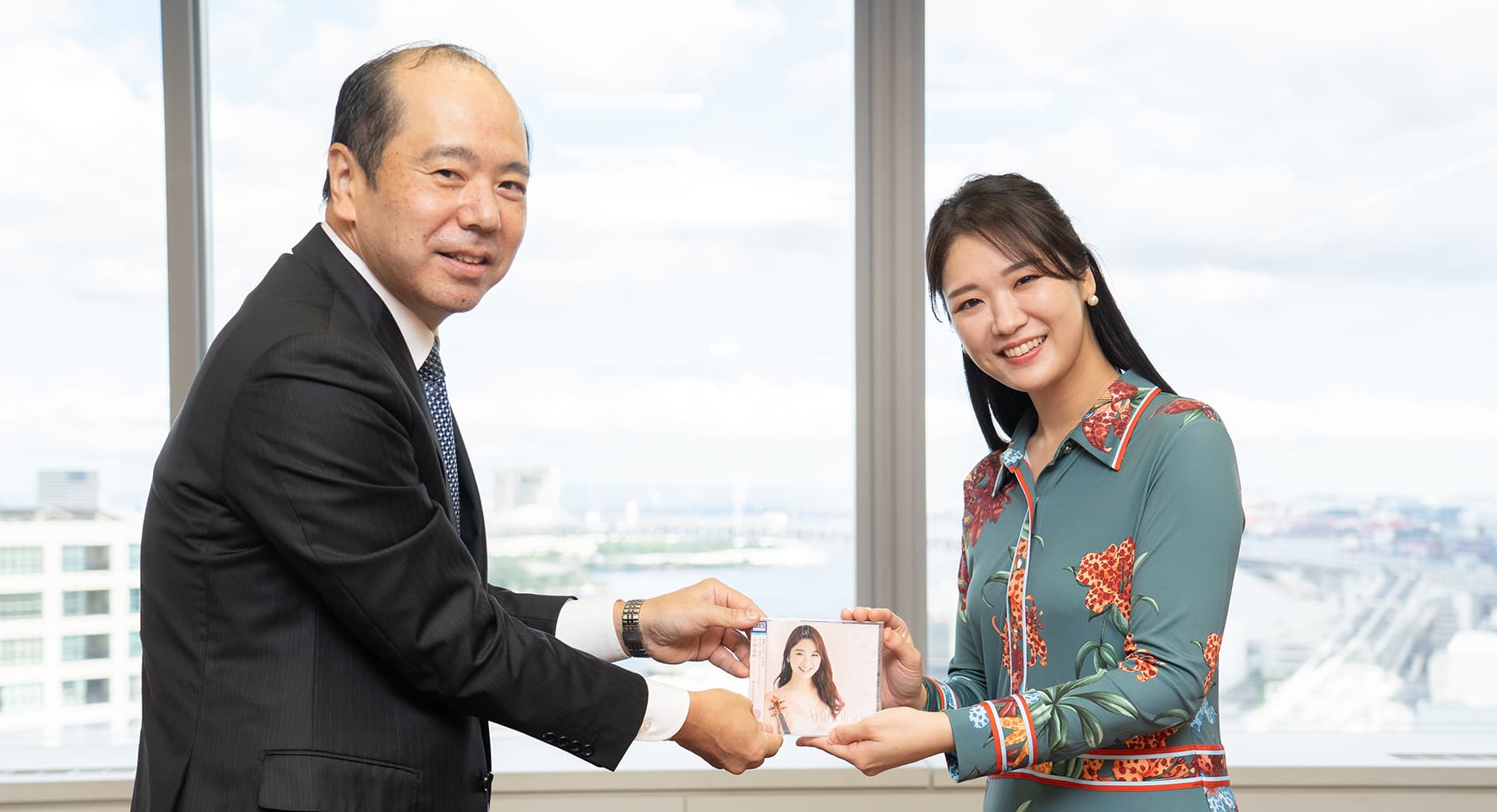
After our talk, Miki Kobayashi gave me her CD.